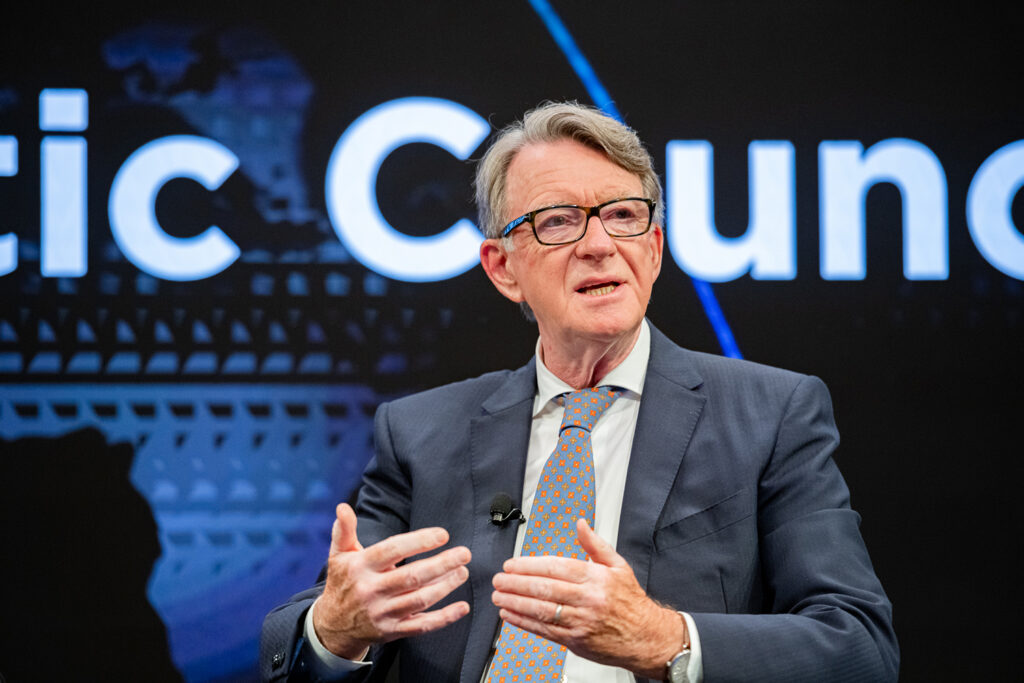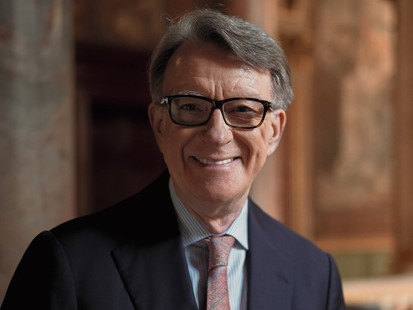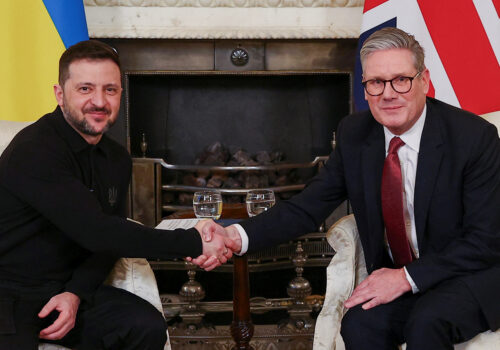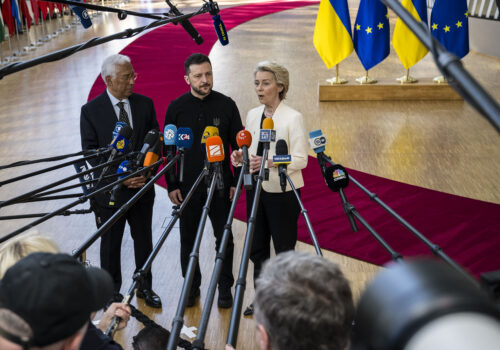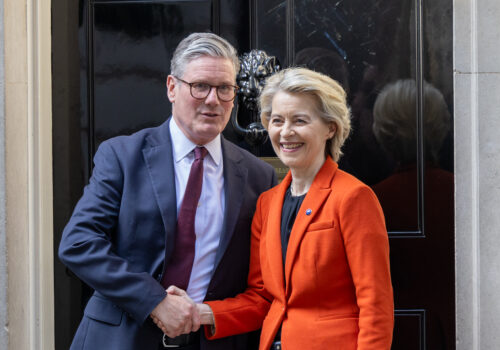On May 27, Peter Mandelson, the British ambassador to the United States, spoke at this year’s edition of the Atlantic Council’s Christopher J. Makins Lecture, a series exploring the state of the Atlantic partnership and its future direction. The below is adapted from his opening speech, entitled “Renewing the Transatlantic Alliance: Peace Through Strength in a New Age of Great Power Rivalry.”
Watch the full event
Eighty years ago this month, the streets of Britain, America, and allied nations erupted in celebration at the fall of fascism in Europe.
For me personally, it’s a source of enormous pride that my grandfather, Herbert Morrison, served as home secretary in Winston Churchill’s wartime coalition.
He also served as deputy prime minister in Clement Attlee’s transformative postwar government in Britain. That government didn’t just support the formation of NATO to counter Soviet expansionism—they were the co-architects of it.
Amidst Cold War tensions and economic upheaval, Britain and America advanced from allies to integrated strategic partners at the dawn of the nuclear age, our scientists having joined forces in the Manhattan Project to create the advantage we had at the beginning of this age.
It was Western unity which ultimately ended the Cold War peacefully and demonstrated resilience to new threats, including the 9/11 attacks, where NATO invoked Article 5 for the first time.
Over eight decades, the foundations of collective defense have remained steadfast whilst the transatlantic relationship has continuously evolved and adapted to counter new challenges.
Today, I want to talk about the profound challenge we face in a new age of great power rivalry, a period characterized by political volatility, by economic mercantilism, and geopolitical competition.
We are witnessing the end of an era of hyper-globalization where we assumed that economic integration had made wars almost obsolete.
The logic seemed compelling: Mutual interests, integrated global supply chains, and shared economic stakes created too much to lose from warfare. History seemed to point only in one direction.
And those comfortable assumptions have been shattered.
We now see the rise of modern mercantilism, where nations prefer to prioritize national economic strength and autonomy in many respects.
States are intervening and playing a more protectionist role in managing trade and directing industrial policy to become ever more self-sufficient and localized.
I’m not declaring globalization dead, but it is being radically reconfigured around us.
China’s export-driven growth strategy flooded the global market with state-subsidized products, undercut Western manufacturing, and hollowed out industry.
The social disruption of rapid technological change, where, if you take media as an example, we have moved suddenly from decades of information flowing to people through established news organizations to a future where you only see “news” online that is curated to what you want to know, or what the algorithm—and those behind it—decides you want to know. And then there’s the backlash against globalization’s uneven distribution of benefits.
You can produce many different numbers to show the widening wealth disparities in the West over the past thirty years, but I would choose a simple one: GDP per capita in the United States has grown about 60 percent to 70 percent in real terms, but real median household income growth has been about 20 percent to 25 percent. The typical American household has not done as well as the booming US economy would suggest. A similar story holds true across all our countries in the West.
This has posed profound challenges to culture, place, and society—which too many of us over the past decades, frankly, have ignored. From the American Midwest to the coastal towns of England, a hands-off approach left many places adrift from the success stories of global cities such as London and New York.
And in a world which has often felt dominated by the exponential rise of social media, a sense of grievance—and of difference between us and them—has been amplified.
So yes, I credit President Trump’s acute political instincts in identifying the anxieties gripping not only millions of Americans, but also far more pervasive global trends: Economic stagnation, a sense of irreversible decline, the lost promise of meaningful work for so many people. These are the giants now that we must confront head-on.
So, where do we go next?
It is in no one’s interest—certainly not those of close allies—that each country pursues a wholly individualized path, which leads to accelerated economic fragmentation.
But if we are serious about rebuilding confidence in the international system, if we wish to maintain a set of common rules and standards—a shared economic and security commons in between us—we need to devote an enormous amount of energy and goodwill to preserve, sustain, and deepen the alliances which exist between like-minded countries.
For the UK and the rest of Europe, we must reboot the transatlantic alliance—indeed, a boot up the proverbial backside is needed now—to deliver peace through strength across three interconnected domains: military, economic, and technological.
For my generation, the twentieth-century gains in peace and prosperity were thought of as a European peace dividend.
I now recognize it as an urgent bill, that peace dividend: An urgent bill for decades of defense underinvestment—a payment that is long overdue.
We have lived in a fantasy created by the US security guarantee, complacent that a friendly heavyweight across the water would be always there when the going gets tough.
We meet in the shadow of Russia’s barbaric invasion of Ukraine, now in its fourth year.
The UK strongly supports President Trump’s initiative to bring this terrible war to an end. And we are working together with partners to secure a just and lasting peace.
The Ukraine conflict has served as a brutal wake-up call. State-on-state war has returned to Europe. Adversaries are using nuclear rhetoric to influence decision-making, and we are seeing regular attacks on European infrastructure beneath the threshold of warfare.
It is crystal clear that European defense must step up and rebalance for our collective security. Actually, I think President Trump is doing Europe a favor by confronting us with this reality.
The United States is the UK’s closest defense and security ally. We must become less dependent on America, while remaining inseparably linked to America—a distinction that I underline of critical importance. Yes, less dependent, but still inseparably linked.
Ukraine is just one flashpoint of many amid growing global instability. Even the US does not have limitless resources.
This is precisely why Britain must step up in providing for European security and why we have committed to the biggest sustained increase in defense spending since the Cold War.
We will become NATO’s fastest-innovating nation, ensuring our military forces have the technological and military capabilities to secure long-term strategic advantage, not just spending more, but spending better.
Of course, this all needs to be grounded in intelligent and effective strategic choices, not merely increased expenditure. Efficiency and innovation to renew our defense manufacturing bases must drive every pound, every dollar, and every euro that we invest.
And we will double down on our alliances. In defense, we will always be NATO first but not NATO only—and this is particularly true of the UK’s focus on the Indo-Pacific, as well as our new security partnership with Europe.
One good example is AUKUS, the trilateral security partnership with Australia and America, which will deliver advanced nuclear-powered submarines and catalyze technology sharing on other advanced capabilities.
Turning to the theme of economic strength, Britain now enjoys something that has eluded us for far too long: a government with both unity of purpose and longevity.
This government’s mandate and President Trump’s will both last for the next four years—providing huge opportunities for collaboration between us.
We are both pro-business and pro-trade in Britain, and committed to innovation, not as empty slogans but as practical imperatives.
This UK government is committed to creating the best investment environment with a regulatory reset that makes us the most competitive in Europe—that’s our aim.
One of the reasons we were able to close the first trade deal of the Trump administration is that our strong economic relationship between our countries is fair, balanced, and reciprocal. But also because, frankly, we are a businesslike nation with pragmatic instincts.
One of the great backhanded insults in British history was when Napoleon Bonaparte dismissed us as a mere “nation of shopkeepers.” He was right: Commerce is the lifeblood which flows through our veins, and that is one reason why we British and American cousins remain so close.
And that is also one reason why I see the current deal as the beginning of a new chapter as well as an end, in a sense, in itself. There is scope for an even more transformative stage in our long partnership. And I believe that centers on technology.
So let me address technological strength as the third. We face a clear, shared threat. There is nothing in this world I fear more than China winning the race for technological dominance in the coming decades.
China represents a far more dynamic and formidable strategic rival than the Soviet Union ever was: economically sophisticated, highly innovative, and strategically patient.
The United Kingdom and United States are the only two Western nations with trillion-dollar technology ecosystems combined with unparalleled talent and research capabilities in our universities and corporations.
We must combine forces, in my view, to drive the scientific breakthroughs that will define this century, and AI should be the spearpoint of that collaboration.
Artificial intelligence stands as the next great foundational technology. Through its power, we can rapidly make progress across so many frontiers of science: quantum, synthetic biology, medicine, nuclear fusion.
Rather than stifling these transformative technologies through excessive regulation, our two governments must unleash their immense potential for human benefit and Western advantage.
Let me say this in conclusion. In his immortal Iron Curtain speech, delivered in Missouri, Churchill spoke eloquently about the primacy of American power and its awesome responsibility to future generations.
Today, we face our own historical inflection point.
No one should doubt that we face accelerating global competition in which it is strongly in our interests to expand the perimeter of our alliances while deepening the transatlantic partnership at its core.
So our diplomacy must be more urgent, more agile, and more creative. We must deepen the political and military alliances which defined our past successes but also create new partnerships—borne in and of technology—which will redefine our future. The stakes could not be higher. The opportunities, actually, could not be greater. And I am confident that our two countries will indeed rise together to meet those challenges.
Peter Mandelson is the British ambassador to the United States.
Watch the full event
Further reading
Tue, Mar 18, 2025
Britain takes the lead as Europe seeks to boost support for Ukraine
UkraineAlert By
With the future of US support for Ukraine in doubt, Britain is leading European efforts to bolster the Ukrainian war effort and deny Putin an historic victory that would place the whole of Europe in peril, writes Alina Hrytsenko.
Thu, Mar 6, 2025
How European leaders are responding to Trump’s approach to Ukraine and Europe
New Atlanticist By
From London and Berlin to Paris and Brussels, European leaders have taken several notable steps this week on security. This follows the blow-up between the Ukrainian and US presidents on February 28.
Thu, May 15, 2025
Can the EU-UK summit lead to a new post-Brexit partnership?
New Atlanticist By Ed Owen
With shared challenges at home and abroad, the United Kingdom and European Union have an opportunity to renew their trade and security ties.
Image: British Ambassador to the US Peter Mandelson spoke at the 2025 Charles J. Makins Lecture at Atlantic Council headquarters in Washington, DC, on May 27, 2025.
